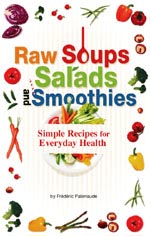Home :Sports Diet: Vegetarian Diet
VEGETARIAN DIET FOR ATHLETES
I believe so! Being an extreme athlete is demanding. Staying fit year-round means a lot of intense work. This means a high requirement of energy. As an athlete you will need to have a minimum calorie level intake to excel at your daily routine. For an athlete the energy requirements may change from 2500 calories per day to 8500 calories per day depending on your activity and exertion levels. Of course, if you are a woman athlete then your calorie requirements will be less then a male athlete. Though I work out 17 plus hours per week, I never go over 2000 calories, so this is going to vary. A young athlete will need more calories.
It is not hard to find good vegetarian protein now and of course fruits, vegetables and nuts will be a mainstay. Many, including the great ultra-runner Scott Jurrek, have become vegetarians. Two of my good friends, who are great adventure racers and triathletes, are vegetarians. THE VEGETARIAN DIET
First of all, an athlete requires protein, iron, and zinc to function efficiently. Protein is a source of great energy to athletes, but more than that protein allows the athlete’s body to receive the necessary nutrients and enzymes for muscle building and muscle fitness. As early as high school, coaches will urge athletes to eat a lot of protein. They encourage meat, steak, chicken and fish as much as possible for recovery and body mass.
Athletes can also eat things like cheeses along with eggs to receive some extra proteins along with enzymes for their bodily processes. However, strict vegetarians (vegans) do not eat eggs, milk, or cheese. Protein Requirements The recommended level of protein by most experts is 1.5 grams of protein per kilo of body weight. Dr. Bob Marshall, of Premier Research believes this is too high, due to the load on the kidney and recommends 1 gram per kilogram of body weight. He also recommends being on not just a vegetarian, but a raw foods diet. Nutrients Vegetarians Need
In addition, intake of zinc boosts the body’s natural immune system and the athlete’s body becomes more resistant and strong. Zinc and iron is best absorbed from meat products and from red meat in particular. However the athlete can certainly use supplements to meet these needs, and the body will be healthier from eating no meat. These two minerals are extremely essential to the body of the athlete and they cannot be passed over. So as you can see a vegetarian diet is doable for an athlete. A determined athlete can eat beans, legumes, nutritional yeast, kefir, yogurt and milk to compensate for the loss of meat. Though I do eat meat, I prefer a vegetarian diet. I find protein from whey and proper food combining works just fine. DIGESTIVE LOAD
In just minutes you can be absorbing the nutrients from fruits and vegetables. An even more immediate uptake of nutrients comes from juicing. Both the whole food and juicing are recommended. However, the body also needs the fiber in the whole foods, so be sure to eat both. Raw fruits and vegetables can take an hour or two for digestion, where as fatty proteins can take a full day. They also must pass through the lymphatic system before entering the bloodstream. Because of improper food, and food combine the average persons meal can take three days or longer to be properly absorbed.[2]The process of digestion uses an average of forty to fifty percent of the total amount of calories consumed, leaving only twenty to thirty percent for activity. [3] By choosing foods that are easy to digest, we can utilize the energy for fuel, recovery and energy. A vegetarian diet is very easy on the digestive system and give you must needed energy. BENEFITS OF A VEGETERIAN DIET
High nutrient value Faster vitamin uptake from quick digestion Low Fat Healthy ORGANIC ATHLETES
Scott Jurek, ultramarathoner Tonya Kay, dancer Adam Myerson, cyclist Jason Sager, mountain biker Christine Vardaros, cyclist Kenneth Williams, bodybuilder [4] REFERENCESBradley Saul, The Organic Athlete [4] Dr. Doug Graham Living Nutrition Magazine vol. 8[1],[2],[3] Vegetarion Resource: Raw Foods Book |
Sign up for our Extreme Adventure FREE Sports-ZineExtreme Adventure Sports Zine |
 Can you get enough energy from a vegetarian diet to compete at a high level?
Can you get enough energy from a vegetarian diet to compete at a high level?  An athlete who is on a vegetarian diet needs to make sure they get some key nutrients, which are found in meat. But it can certainly be done, and is very healthy for you and your performance!
An athlete who is on a vegetarian diet needs to make sure they get some key nutrients, which are found in meat. But it can certainly be done, and is very healthy for you and your performance! But do you really need meat for protein? Absolutely not! There are many sources of great protein including whey and combining certain foods. All they have to do is eat protein rich vegetables like legumes and beans to receive the protein that they need.
But do you really need meat for protein? Absolutely not! There are many sources of great protein including whey and combining certain foods. All they have to do is eat protein rich vegetables like legumes and beans to receive the protein that they need.  Since strong and fit muscles are key to the success of athletes in many sports, one can understand the importance of proteins in a diet. Besides the protein, athletes must intake lots of iron and zinc for their bodies to feel and be fit. Iron is very important for muscles and for the blood processes
Since strong and fit muscles are key to the success of athletes in many sports, one can understand the importance of proteins in a diet. Besides the protein, athletes must intake lots of iron and zinc for their bodies to feel and be fit. Iron is very important for muscles and for the blood processes The heavier the meal the more digestion stress there is in the body. At age 20, we start losing our digestive enzymes.
The heavier the meal the more digestion stress there is in the body. At age 20, we start losing our digestive enzymes. Digestive enzymes in each meal
Digestive enzymes in each meal Molly Cameron, cyclist
Molly Cameron, cyclist





